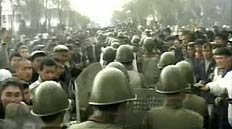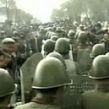
KYRGYZSTAN, UN DISAGREE OVER REMAINING ANDIJAN REFUGEES
Publication: Eurasia Daily Monitor Volume: 2 Issue: 150
By:

Uzbek human rights activists officially thanked Kyrgyzstan, the UN, and the OSCE for letting refugees from the May riots in Andijan, Uzbekistan, find asylum in a third country. Last week 439 Andijan refugees were sent to Romania en route to host countries that had agreed to provide political asylum. However, debates on whether Bishkek should repatriate the remaining 15 refugees held in the Osh jail for criminal charges are heating up among Kyrgyz officials, the Uzbek government, and the international community (see EDM, July 28).
According to the 1951 UN Convention on Refugees, which Kyrgyzstan has observed since gaining independence, criminals charged in another country cannot receive refugee status and must be sent back to their country of residence. However, the Kyrgyz government has been clearly pressured by the UN High Commissioner for Refugees and the U.S. Embassy in Kyrgyzstan to take a political approach to the issue, not a legal one.
A group of Andijan refugees previously repatriated by Bishkek in June faced severe treatment from the Uzbek security services. One of them reportedly died from torture. Observers believe that if the remaining 15 men are sent back, they will face even harsher punishment. U.S. Ambassador Steven Young warned Kyrgyz Prosecutor-General Azimbek Beknazarov that he would responsible for the fate of the 15 men.
Beknazarov claims that the UN’s demands to leave the criminals in Kyrgyzstan contradict its own 1951 Convention. According to the prosecutor, it is against the UN law to grant refugee status without a fair trail. Further, if the criminals are not defined as “refugees,” Kyrgyzstan has no right to send them to a third country (Kabar, August 1). “As prosecutor-general of Kyrgyzstan, I am executing precisely the demands of the convention on refugees. Without violating any clause, we are [placed] under unprecedented pressure,” he protested.
Beknazarov added that, under ex-president Askar Akayev, representatives of regional powers had become accustomed to pressing Kyrgyzstan to take political decisions in place of legal ones. It is now time for Kyrgyzstan to assert greater independence in decision-making, with a preference for upholding the rule of law, he declared.
“We, as a neutral side, must find the truth that is somewhere in the middle. It is not necessary to politicize the situation,” says Deputy Prosecutor General Nurlan Jeenaliyev. He maintains that the convicts committed criminal, not political, offenses. Three of the 15 have already been denied refugee status by the UNHCR. The remaining 12, according to the Kyrgyz Prosecutor-General, committed crimes long before the Andijan crisis (Akipress, August 1). The Kyrgyz Prosecutor-General has sufficient evidence to prove the men’s guilt on charges of terrorism and murder.
The fate of the remaining refugees has generated controversy among the Kyrgyz public. Kyrgyz human rights activist Tursunbai Akun says, “Beknazarov is making a huge mistake that will damage the positive image of Kyrgyzstan and [newly elected] President Kurmanbek Bakiyev” before his inauguration ceremony on August 14 (Kabar, August 1). “Why are similar demands not presented before [Uzbek President Islam] Karimov?” asks a Kyrgyz NGO leader. Another expert argues, “Kyrgyzstan has became an arena for SCO [Shanghai Cooperation Organization] members, the U.S., and the Uzbek government to advocate their own interests. Kyrgyzstan is the only country to suffer this turmoil.”
U.S. Secretary of State Condoleezza Rice officially approved the Kyrgyz government’s decision not to return most of the refugees to Uzbekistan, however she reportedly wanted the 15 convicts to leave Kyrgyzstan with the larger group. Rice is expected to attend Bakiyev’s inauguration ceremony, as are the presidents of Kazakhstan and Tajikistan. The presidents of Russia and Uzbekistan will send representatives.
Meanwhile, Kyrgyz journalist Erkin Yakubjanov, captured by Uzbek security agents for conducting unsanctioned interviews of Uzbek citizens crossing the border, was released on July 30 after ministerial-level Kyrgyz-Uzbek negotiations reached an agreement. Yakubjanov was held in Uzbekistan for twelve days.
As a response to the U.S. stance regarding the Andijan refugees, on July 29 the Uzbek government sent an official note to the U.S. Embassy demanding that Washington withdraw its military from Uzbekistan within 180 days. According to U.S. officials, closure of the U.S. military base in Uzbekistan would not be a significant loss; the forces will be relocated to Manas Airport in Bishkek (Akipress August 1). The only difficulty the U.S. forces could face is longer flight time to Afghanistan should Uzbekistan also close its air space to U.S. aircraft. U.S. payments for its current contingent at Manas already represent a significant part of the Kyrgyz GDP. Relocating the U.S. troops from Uzbekistan will make those payments even higher.
If any of the remaining 15 Andijan refugees are eventually sent back to Uzbekistan, the Kyrgyz judiciary will have exercised its independence, which Bishkek believes was violated too often in the past by international forces. However, Prosecutor-General Beknazarov will face harsh criticism at home and abroad as he tries to solve the refugees’ status within a legal framework.




